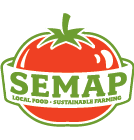BY KENDRA MURRAY
If you’re plugged into the local agriculture scene, you’ve probably heard talk about a meat processing facility being built in Southeastern Massachusetts. It’s no secret that livestock production in the area is down, mainly because there isn’t anywhere local for farmers to take their animals to be processed. With many folks traveling out of state and up to 3 or 4 hours to get to a USDA inspected facility, it is clear barrier to raising animals for meat. A couple of years ago a group of producers put their heads together to try to find a solution to this problem and the Southeastern Massachusetts Livestock Association (SEMALA) was born.

SEMALA was the brainchild of Andy Burnes, Darrin Mendes, and Barry Gross, along with Kristin Irvin, Russ Craig, and David Brownell. Originally the organization was formed with the sole goal of raising funds and building a USDA inspected meat processing facility in Southeastern Mass. However, the organization has evolved. What started as SEMALA is now known the Livestock Institute of Southern New England, or TLI. They are in the process of filing paperwork as a 501c3 non-profit, focusing not only on the construction of a slaughterhouse, but also community education.

TLI has purchased 10 acres of land in Westport for the construction of their processing facility. Land is already being cleared and they have completed their floor plan. In about a month, they will begin the construction bidding process. TLI is hoping to break ground on their 10,000 square foot facility by September 2016. This USDA inspected facility will be able to accommodate all large livestock, including cattle, hogs, sheep, and goats.

The initial facility will be handling a throughput of approximately 2,000 animals per year, with the ability to process up to 5,500. TLI is building with an expansion in mind; they are hoping to be able to accommodate up to 7,500 animals per year. In addition to processing animals, the slaughterhouse will also feature a retail outlet full of local meats. Different cuts, animals, and management techniques will ensure a range of prices to fit many budgets. An on-site smokehouse is also planned. As TLI grows, they hope to be able to offer some cooked products and charcuterie.

TLI has four main goals: humane slaughter and handling, the highest food safety standards, accountability, and community education. Temple Grandin, a professor of animal science and consultant to the livestock industry on animal behavior, has designed the settling barns, chutes, and slaughtering area to ensure humane handling. As far as accountability goes, there will be a strict tracking system in place. Animals will be weighed live and after kill, and farmers will be made aware of these weights to ensure that they are getting their entire animal back. TLI hopes that with the construction of their slaughterhouse they will be able to bridge the gap between producers and processors, and address the barriers of increasing production and sale of local meat.

The education component of TLI goes much deeper than just hosting workshops for farmers. With the average age of farmers around sixty, it is essential to get the next generation interested in raising animals. TLI hopes to offer space for observation and training for school groups, interns, and potential apprentices. Workshops will give participants the basic knowledge for raising high quality animals and following humane treatment guidelines. These programs will be offered to high school students, college students, and professionals and will be developed in collaboration with local educational institutions. Training will be offered to culinary students, farmers, and those interested in learning about meat cutting and value added processing, as well.

Not only will workshops be held for high school and college students, but also backyard farmers, farmers already raising livestock, and consumers. Many folks are interested in starting a backyard “hobby” farm, but don’t know where to start. These workshops offer important training for those with limited experience with animals. TLI wants to help build a more self sufficient New England food system, and backyard farming is a huge part of that. Experienced farmers will benefit from workshops that make sure that they are incorporating best management practices into their operations. There will also be classes for consumers focusing on different cuts of meat and how to prepare them, the importance of the local food movement, and more, as a means to reconnect folks to their food system.

Although a small organization, their plans are great, and they will be able to achieve them with the support of the community. Check out their website at www.thelivestockinstitute.org for more information and feel free to email info@thelivestockinstitute.org with any questions. We’ll be partnering with TLI again for this year’s Farm to Tapas…proceeds will not only help benefit SEMAP’s TIE grants, but also TLI’s educational programming. See you there!
